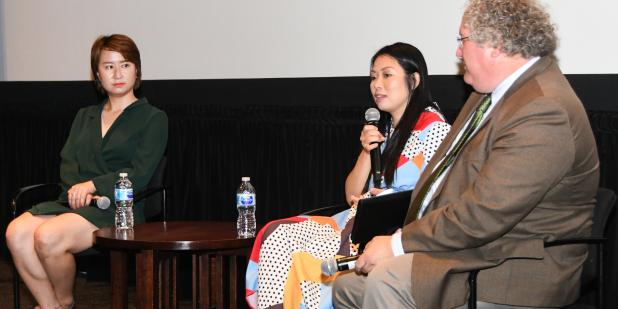Join us for a free one-day workshop for educators at the Japanese American National Museum, hosted by the USC U.S.-China Institute and the National Consortium for Teaching about Asia. This workshop will include a guided tour of the beloved exhibition Common Ground: The Heart of Community, slated to close permanently in January 2025. Following the tour, learn strategies for engaging students in the primary source artifacts, images, and documents found in JANM’s vast collection and discover classroom-ready resources to support teaching and learning about the Japanese American experience.
One Child Nation Screening
From award-winning documentarian Nanfu Wang, One Child Nation explores the ripple effect of this devastating social experiment, uncovering one shocking human rights violation after another - from abandoned newborns, to forced sterilizations and abortions, and government abductions.

Directed & Produced by Nanfu Wang & Jialing Zhang.
Winner: Grand Jury Prize, Documentary
Sundance Film Festival 2019
About One Child Nation
China’s One Child Policy, the extreme population control measure that made it illegal for couples to have more than one child, may have ended in 2015, but the process of dealing with the trauma of its brutal enforcement is only just beginning. From award-winning documentarian Nanfu Wang (Hooligan Sparrow, I Am Another You) and Jialing Zhang, the sweeping One Child Nation explores the ripple effect of this devastating social experiment, uncovering one shocking human rights violation after another - from abandoned newborns, to forced sterilizations and abortions, and government abductions. Wang digs fearlessly into her own personal life, weaving her experience as a new mother and the firsthand accounts of her family members into archival propaganda material and testimony from victims and perpetrators alike, yielding a revelatory and essential record of this chilling, unprecedented moment in human civilization.
One Child Nation is a stunning, nuanced indictment of the mindset that prioritizes national agenda over human life, and serves as a first-of-its-kind oral history of this collective tragedy - bearing witness to the truth as China has already begun to erase the horrors of its “population war” from public record and memory.
About the Panelists

 Clayton Dube heads the USC U.S.-China Institute. The institute focuses on the multidimensional and evolving U.S.-China relationship. Dube was trained as a historian, working on modern Chinese economic history. He lived in China for five years and has visited over sixty times for research, to lead delegations, or to lecture. Dube has long been committed to working to inform public discussion of U.S.-China ties. He was associate editor of the academic journal Modern China and editorial director for the online magazines AsiaMedia, Asia Pacific Arts, and US-China Today. He’s produced documentary films, including the institute’s twelve-part Assignment: China series on American reporting on China from the 1940s to today. He’s earned teaching awards at three universities and co-manages Chinapol, a private discussion list of academics, journalists, diplomats and other China-watchers.
Clayton Dube heads the USC U.S.-China Institute. The institute focuses on the multidimensional and evolving U.S.-China relationship. Dube was trained as a historian, working on modern Chinese economic history. He lived in China for five years and has visited over sixty times for research, to lead delegations, or to lecture. Dube has long been committed to working to inform public discussion of U.S.-China ties. He was associate editor of the academic journal Modern China and editorial director for the online magazines AsiaMedia, Asia Pacific Arts, and US-China Today. He’s produced documentary films, including the institute’s twelve-part Assignment: China series on American reporting on China from the 1940s to today. He’s earned teaching awards at three universities and co-manages Chinapol, a private discussion list of academics, journalists, diplomats and other China-watchers. Langou Lian is a phd candidate in sociology at the University of California, Irvine. Lian's work focuses on private life in China, including Chinese's young adults' intimate relations nowadays. It looks at how gender systems influence young men and women's relationship decisions and formation. One important part about how the family planning policy might have shaped young people's private life is that we are seeing this new generation of women who have been the center of family investment. Unlike the older generations, they do not have to share resources with siblings or sacrifice for the success of their brothers. This unintended consequence of the One-Child policy created a generation of women who are highly educated and independent. It changes how they view intimate relations itself, and it also changes how they make decisions within heterosexual relations.
Langou Lian is a phd candidate in sociology at the University of California, Irvine. Lian's work focuses on private life in China, including Chinese's young adults' intimate relations nowadays. It looks at how gender systems influence young men and women's relationship decisions and formation. One important part about how the family planning policy might have shaped young people's private life is that we are seeing this new generation of women who have been the center of family investment. Unlike the older generations, they do not have to share resources with siblings or sacrifice for the success of their brothers. This unintended consequence of the One-Child policy created a generation of women who are highly educated and independent. It changes how they view intimate relations itself, and it also changes how they make decisions within heterosexual relations.Featured Articles
Please join us for the Grad Mixer! Hosted by USC Annenberg Office of International Affairs, Enjoy food, drink and conversation with fellow students across USC Annenberg. Graduate students from any field are welcome to join, so it is a great opportunity to meet fellow students with IR/foreign policy-related research topics and interests.
RSVP link: https://forms.gle/1zer188RE9dCS6Ho6
Events
Hosted by USC Annenberg Office of International Affairs, enjoy food, drink and conversation with fellow international students.
Join us for an in-person conversation on Thursday, November 7th at 4pm with author David M. Lampton as he discusses his new book, Living U.S.-China Relations: From Cold War to Cold War. The book examines the history of U.S.-China relations across eight U.S. presidential administrations.




